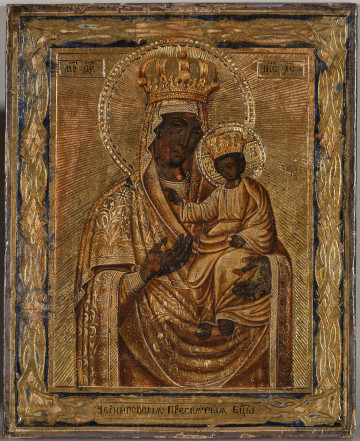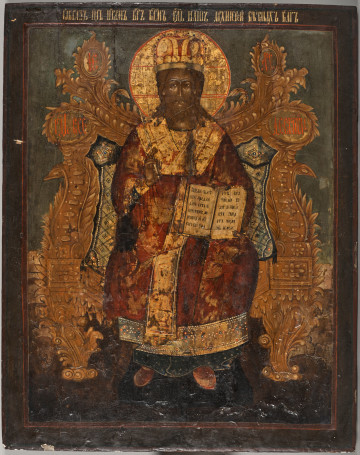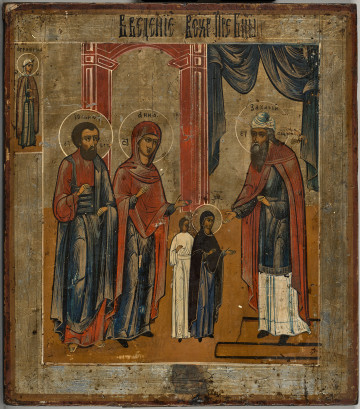
The Mother of God of Hodigitria
19th (?) century
Castle Museum in Łańcut
Part of the collection: Ikony
The depiction of the Resurrection and Christ’s Descent into the Abyss in the centre of the composition illustrates the most important Christian feast of the Resurrection, shown together with the other twelve solemn feasts in the annual calendar icon called menologium, see S.12766MŁ, S.12823MŁ, S.12949MŁ. Since no human being witnessed the act of Resurrection, the Christian tradition of the first centuries depicted the miracle indirectly, for example, through the image of the Women standing by the empty tomb. Before the end of the first millennium, the Resurrection was illustrated through the representation of the Christ’s Descent into the Abyss. This event immediately preceded the miracle of the Resurrection and at the same time was the last act of the cycle of Passion. In addition, it is mentioned in the canonical or inspired books of the New Testament, the prophecies of the Old Testament and described in detail in the extensive non-canonical apocryphal literature. It was not until the 17th and 18th centuries that, under the influence of West European art, depictions of the Risen Christ coming out of the tomb appeared in the lands of old Ruthenia. Since then, both images often appear in one pictorial composition, as can be seen in the presented icon. In the upper zone, apart from Christ, there are also the Angel and the Women depicted by the tomb, as well as, in the upper left corner, St Peter by the empty tomb, below the angelic hosts at the head of which the Archangel Michael tames Satan. In the upper right corner, there is Paradise, behind the walls of which stand Elijah and Elisha. In the lower area we see Christ, who broke down the gates of hell, shaking hands with Adam, and next to him kneels Eve; above them (diagonally) the hosts of kings, prophets and righteous of the Old Testament, liberated from the abyss, enter the gates of Paradise, led by John the Baptist, where they are welcomed by the Good Thief. The depiction is completed in the lower right corner by the scene of the invocation of St Peter on the Sea of Galilee. Teresa Bagińska-Żurawska https://orcid.org/0000-0002-9243-3967
Dimensions
height: 53 cm, width: 44.5 cm
Object type
Icons
Technique
gilding, tempera
Material
silver, tempera, wood
Origin / acquisition method
decyzja administracyjna
Creation time / dating
Creation / finding place
Owner
Castle Museum in Łańcut
Identification number
Location / status

19th (?) century
Castle Museum in Łańcut

1800 — 1850
Castle Museum in Łańcut

1800 — 1899
Castle Museum in Łańcut
DISCOVER this TOPIC
Castle Museum in Łańcut
DISCOVER this PATH
Educational path